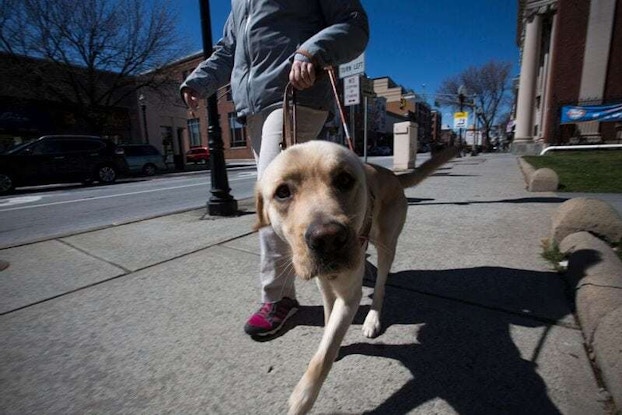
In 1927, Dorothy Harrison Eustis, an American living in Switzerland, penned an article for The Saturday Evening Post that forever changed the lives of visually impaired individuals across the United States. The Philadelphia native, who at the time was working with Swiss police to help train German shepherds, wrote about a program she had observed in Germany in which dogs were trained to guide World War I veterans who had been blinded by mustard gas.
Her story caught the attention of a blind New Yorker named Morris Frank, who wrote to Eustis and offered to set up a first-of-its-kind guide dog school in America if the author would train him to work with his own canine companion. She agreed, and upon his return — accompanied by a new four-legged assistant named Buddy — Frank made good on his promise. He established The Seeing Eye guide dog school in 1931 and ignited a new era of independence for the visually impaired.
Nearly a century later, in a quiet town in northern New Jersey, Peggy Gibbon and her team at The Seeing Eye are continuing the important work that Eustis and Frank started.
“We are always working with volunteers, researchers and staff to improve…to be better,” said Gibbon, the group’s director of canine development.
From 'humble beginnings' to facing challenges
Though its mission hasn’t changed, the organization has evolved quite a bit from its humble beginnings. Whereas it used to train only about a dozen dogs per year, the school now works with 500 puppy raisers, also known as foster families, across the northeast to help match an average of 28 to 38 guide dogs per month, helping hundreds of visually impaired individuals regain or find a newfound sense of independence and mobility every year. That keeps Gibbon plenty busy — and surrounded by furry friends — around the clock.
“I really am surrounded by dogs all the time,” she says with a laugh.
On first glance, Gibbon’s work is sure to spark envy from dog lovers; however, it’s enormously demanding and constantly evolving work. In today’s increasingly fast-paced and technologically advanced world, the blind face a variety of challenges that include everything from browsing the internet to using smartphones. Recent automotive innovations have also impacted the way trainers work with prospective guide dogs.
When a blind person graduates with their dog, they own the dog, no strings attached.Peggy Gibbon, director of canine development, The Seeing Eye
“The environment has become busier in that time, more cars [on the road], and even quieter cars with hybrid and electric,” Gibbon says. “Those make it tough for a blind person because they’re really hard to hear. We have to keep pace with those changes.”
There’s also heightened competition from other guide dog schools — a welcome development for visually impaired individuals, but one that puts pressure on Gibbon and her organization to stay ahead of the curve and abreast of new techniques and best practices.
“It’s like looking at different colleges, everybody has a slightly different way of doing things,” says Gibbon, about The Seeing Eye compared to the dozens of other training facilities across the country. “[They have] a different way of training, of working with people.”
Standing out, and pairing the 'right dog with the right person'
One of the characteristics that Gibbon says helps The Seeing Eye stand out from other schools is its unique ownership policy. “One of the other things that make us really stand out is our ownership policy,” explains Gibbon. “When a blind person graduates with their dog, they own the dog, no strings attached,” she says. “We feel that is very important from a self-respect and independence issue.”
Unlike in its early years, the charity also uses a variety of dogs with experts focused on picking elite animals with a friendly disposition, high intelligence and patient temperament — those that don’t make the cut as guide dogs can be adopted and work for other organizations like the TSA or police.
At the end of the day, the most important thing is finding an owner the right dog, that’s why applicants are required to spend a full month in one-on-one training sessions learning to work with guide dogs, and it’s why Gibbon says her team spends lots of time getting to know each blind person who walks through their doors, pouring into the details of their day-to-day lifestyle.
“Getting the right dog with the right person is what it comes down to,” Gibbon says.
CO— aims to bring you inspiration from leading respected experts. However, before making any business decision, you should consult a professional who can advise you based on your individual situation.
CO—is committed to helping you start, run and grow your small business. Learn more about the benefits of small business membership in the U.S. Chamber of Commerce, here.

What can membership do for your business?
Gain tools to stay informed, competitive, and connected by becoming a U.S. Chamber of Commerce member. Membership gives you direct access to expert policy insights, economic updates, and exclusive resources designed to help your business thrive. From behind-the-scenes analysis from D.C. to exclusive discounts and expert support, U.S. Chamber membership helps you navigate change and seize new opportunities.







